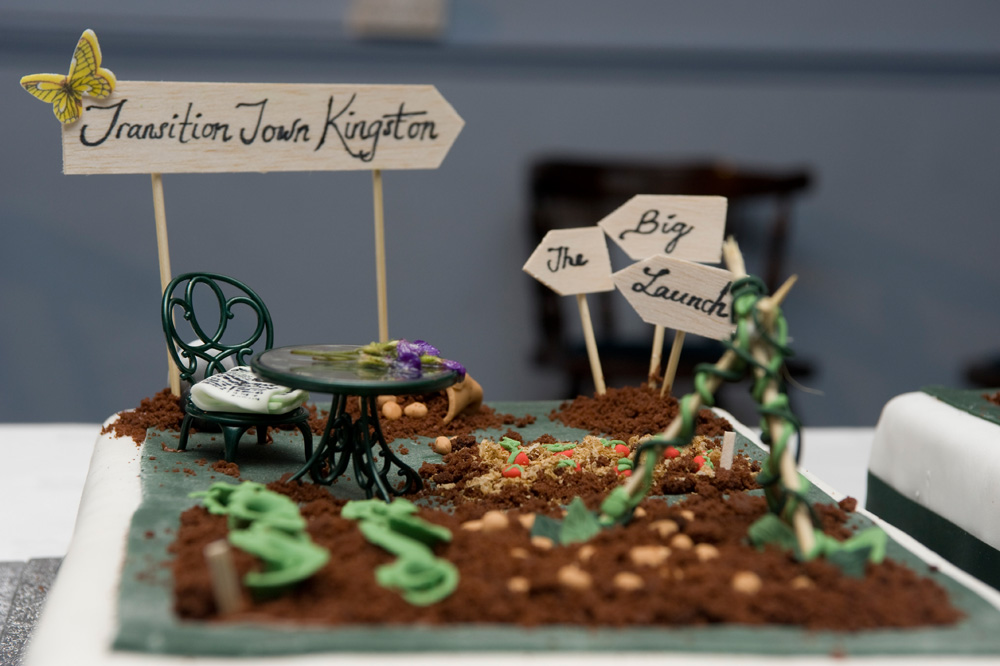
by Shaun Chamberlin | Apr 20, 2010 | All Posts, Favourite posts, Transition Movement
So the big day finally came and went, and glorious it was too. I'm still smiling from the wonderful energy of it all. Pause a moment to take in the brilliance of the TTK cake (TT Kake?) before clicking through to a peek at the many-splendoured event itself, including a chance to see the accomplished and inspired short movie of TTK's story to date that premièred on the night.
The energy levels never dropped after the buzz of the children's hour that kicked the day off, with gleeful kids seeing a real bee hive, making puppets out of plastic bags, writing poetry, getting faces painted etc etc while the parents browsed the stalls of local green businesses and organisations...
 Next, local inspiration Robin Hutchinson entertainingly introduced talks from our local MPs (although this close to the election he had to describe them as "Parliamentary candidates who you may remember from their previous jobs"!), our mayor, the head of the Council, me and the ever-entertaining David Fleming, back by popular demand, who hesitated to despoil the cake by doing us the honour of cutting it.
Next, local inspiration Robin Hutchinson entertainingly introduced talks from our local MPs (although this close to the election he had to describe them as "Parliamentary candidates who you may remember from their previous jobs"!), our mayor, the head of the Council, me and the ever-entertaining David Fleming, back by popular demand, who hesitated to despoil the cake by doing us the honour of cutting it.
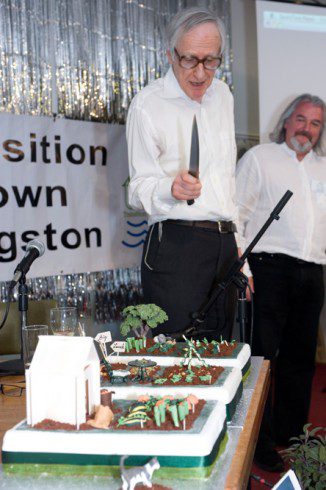 We also received a congratulatory video message from Rob Hopkins before a planned Open Space session, in which we faced the real challenge of getting everyone to stop having passionate, deeply involved conversations long enough so that we could explain to them how wonderfully Open Space could facilitate such conversations.
With Prisca Baron singing to a rapt audience of children and adults alike, DJ Matt providing the soundtrack late into the night and Toni Izard and family laying on an amazing spread of food and refreshments, it felt like a real triumph of community spirit, with smiles on the faces of old stalwarts and total newcomers alike.
We also received a congratulatory video message from Rob Hopkins before a planned Open Space session, in which we faced the real challenge of getting everyone to stop having passionate, deeply involved conversations long enough so that we could explain to them how wonderfully Open Space could facilitate such conversations.
With Prisca Baron singing to a rapt audience of children and adults alike, DJ Matt providing the soundtrack late into the night and Toni Izard and family laying on an amazing spread of food and refreshments, it felt like a real triumph of community spirit, with smiles on the faces of old stalwarts and total newcomers alike.
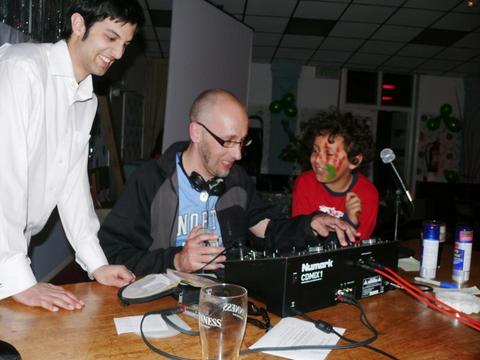 I didn't manage to get a handle on the numbers there (perhaps 250??), but it was great to see so many unfamiliar faces mingling happily, and contributing to the Kingston Timeline that we pinned to the wall (see some of the ideas it produced here).
Even the venue itself felt like a new ally, as almost everyone attending had never set foot in Kingston Working Men's Club before, despite its location tucked away right in the heart of Kingston. A great many more people know it's there now, and hopefully a few lasting connections have been forged.
For me personally, the two particular highlights in a night of delights were the deliciously brilliant (and brilliantly delicious!) cake - or actually three cakes - and the TTK movie. Credit for the first, and for the photos featured here, goes to our talented trio Libby, Jonny and Maria, AKA Caking Agent.
I didn't manage to get a handle on the numbers there (perhaps 250??), but it was great to see so many unfamiliar faces mingling happily, and contributing to the Kingston Timeline that we pinned to the wall (see some of the ideas it produced here).
Even the venue itself felt like a new ally, as almost everyone attending had never set foot in Kingston Working Men's Club before, despite its location tucked away right in the heart of Kingston. A great many more people know it's there now, and hopefully a few lasting connections have been forged.
For me personally, the two particular highlights in a night of delights were the deliciously brilliant (and brilliantly delicious!) cake - or actually three cakes - and the TTK movie. Credit for the first, and for the photos featured here, goes to our talented trio Libby, Jonny and Maria, AKA Caking Agent.
 The second was the work of Elise Toogood and Nick Barron of Tenth Egg, and you can see it in all its glory below. As both cake and film were only finished in the early hours of the morning of the event, both were genuine surprises even for those of us heavily involved in pulling the event together.
Films at their best have a wonderful way of evoking a sense of overarching narrative, and for me personally it was a delight to feel this as I watched it. Despite knowing all of the projects featured - or perhaps because of that - it was deeply satisfying to see the different threads pulled together into this tapestry.
Many thanks too to those who organised the surprise for the six of us on TTK's Temporary Steering Group, pulling us on stage to present each of us with our very own blueberry bush! It would be impossible to mention everyone who made the event possible, but hopefully they all enjoyed it as much as I did.
I will add more photos below as they come in, including the happy crowds and impressive before and after pics from the decoration efforts on Friday evening.
My apologies if this post is rather excitable - I can only confess that I'm still excited! Just as an Unleashing should, this has reminded me what a marvellous community I live in, and feels like a historic launchpad to a happier, more thrivacious Kingston!
[caption id="attachment_1933" align="alignnone" width="480"]
The second was the work of Elise Toogood and Nick Barron of Tenth Egg, and you can see it in all its glory below. As both cake and film were only finished in the early hours of the morning of the event, both were genuine surprises even for those of us heavily involved in pulling the event together.
Films at their best have a wonderful way of evoking a sense of overarching narrative, and for me personally it was a delight to feel this as I watched it. Despite knowing all of the projects featured - or perhaps because of that - it was deeply satisfying to see the different threads pulled together into this tapestry.
Many thanks too to those who organised the surprise for the six of us on TTK's Temporary Steering Group, pulling us on stage to present each of us with our very own blueberry bush! It would be impossible to mention everyone who made the event possible, but hopefully they all enjoyed it as much as I did.
I will add more photos below as they come in, including the happy crowds and impressive before and after pics from the decoration efforts on Friday evening.
My apologies if this post is rather excitable - I can only confess that I'm still excited! Just as an Unleashing should, this has reminded me what a marvellous community I live in, and feels like a historic launchpad to a happier, more thrivacious Kingston!
[caption id="attachment_1933" align="alignnone" width="480"] picture courtesy of Simone Kay[/caption]
picture courtesy of Simone Kay[/caption]

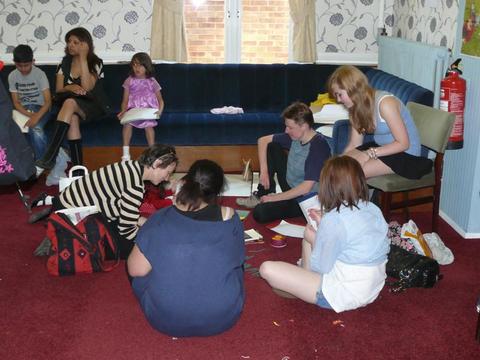 Poetry workshop
Poetry workshop
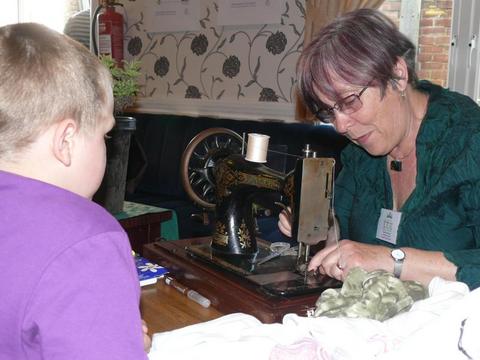
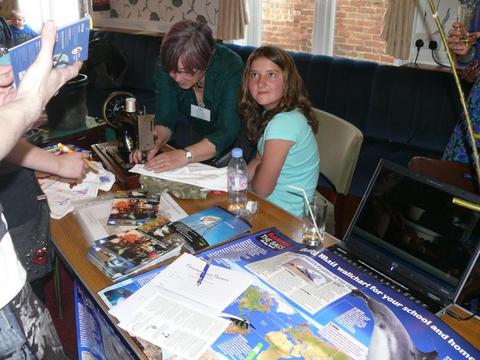 [caption id="attachment_1934" align="aligncenter" width="320"]
[caption id="attachment_1934" align="aligncenter" width="320"] Bags created on the day, picture courtesy of Simone Kay[/caption]
Bags created on the day, picture courtesy of Simone Kay[/caption]
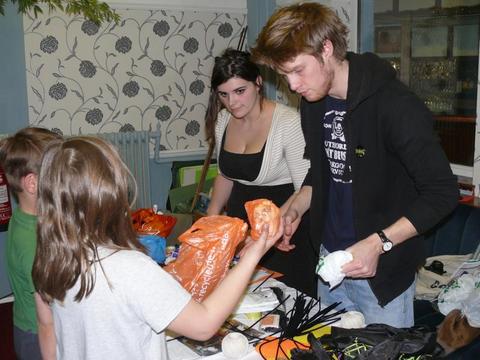 Making puppets from plastic bags
Making puppets from plastic bags
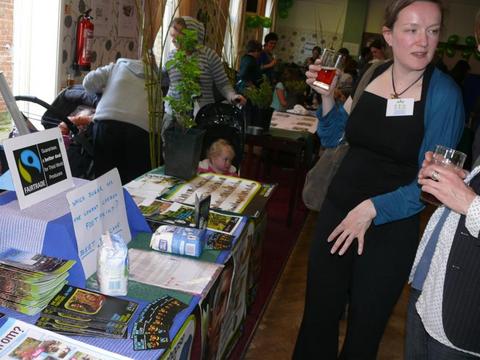
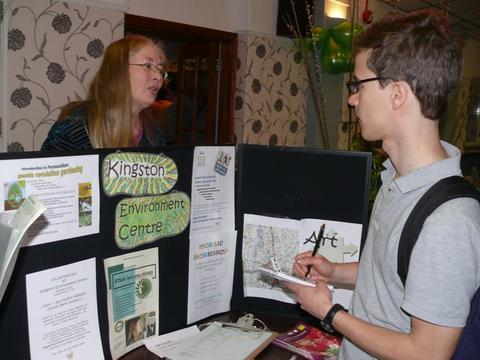
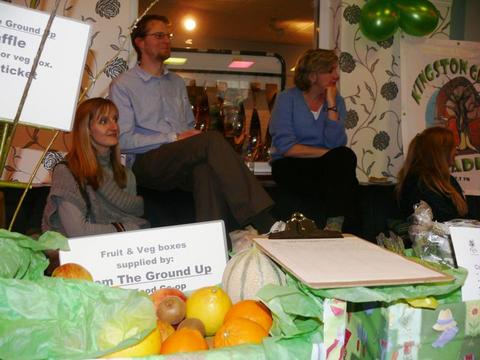
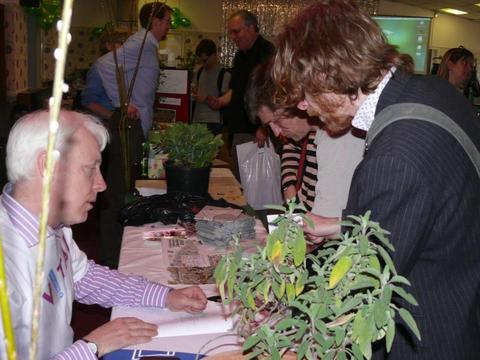
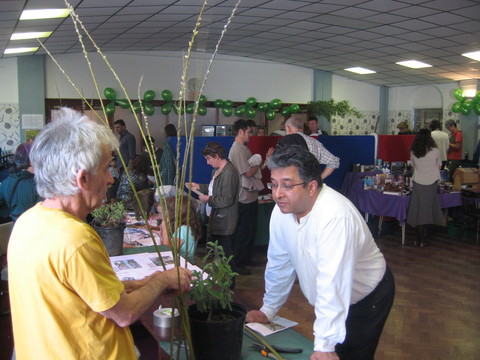
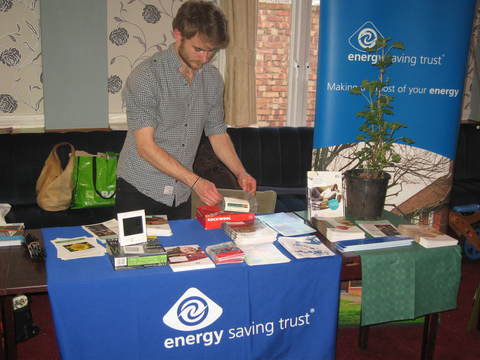
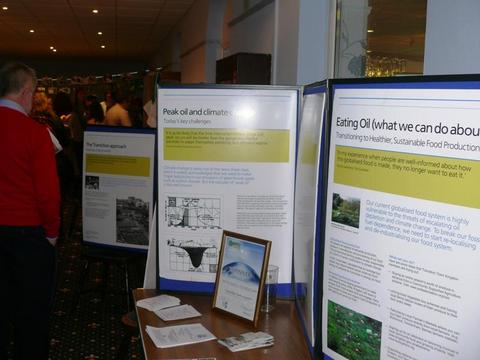 Stalls and info from TTK groups, local businesses and organisations
Stalls and info from TTK groups, local businesses and organisations
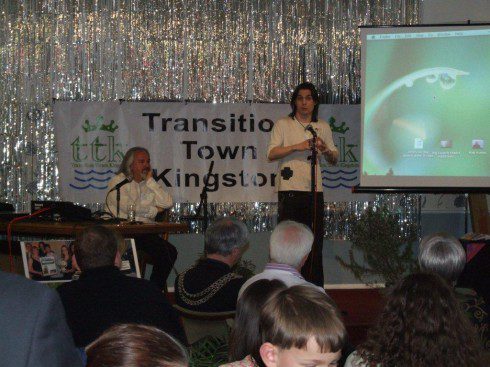
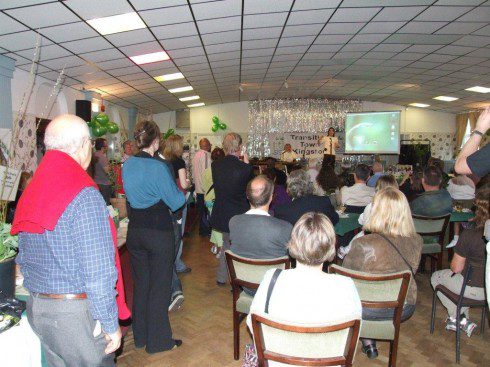 Me speaking about the origins of Transition and TTK
Me speaking about the origins of Transition and TTK
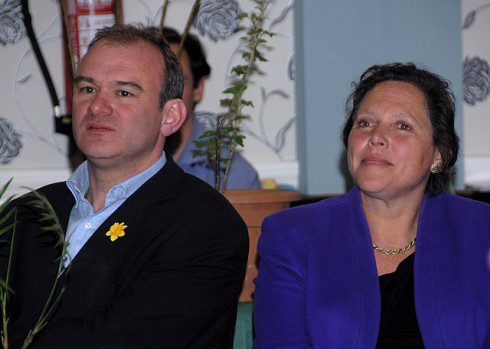 Our local MPs, Ed Davey and Susan Kramer
Our local MPs, Ed Davey and Susan Kramer
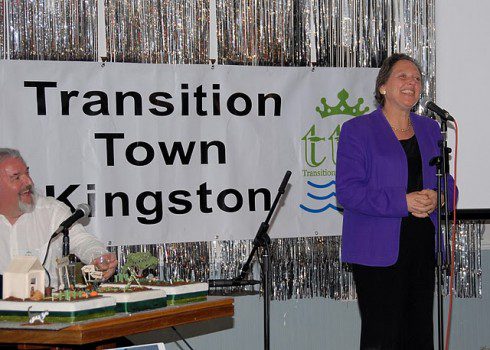
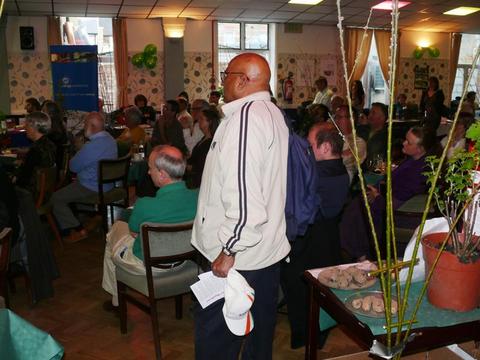
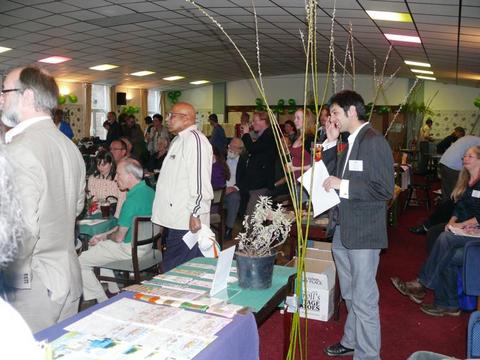
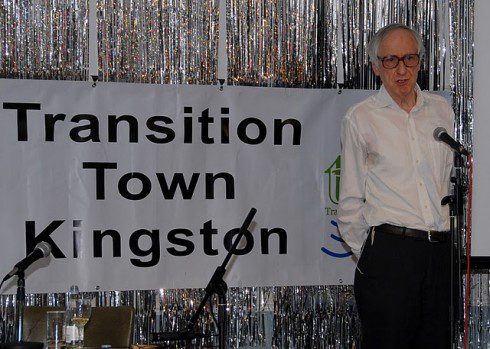 David Fleming speaking
David Fleming speaking
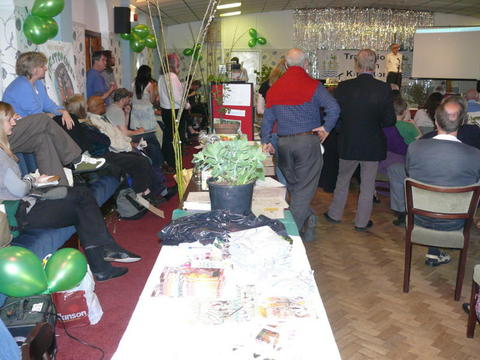
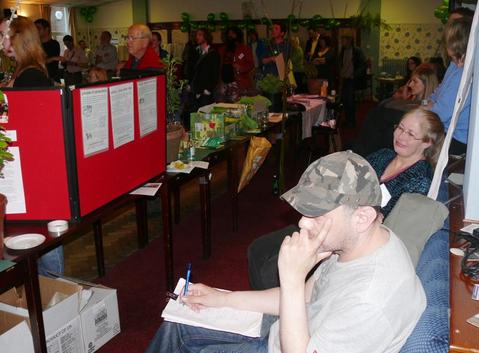

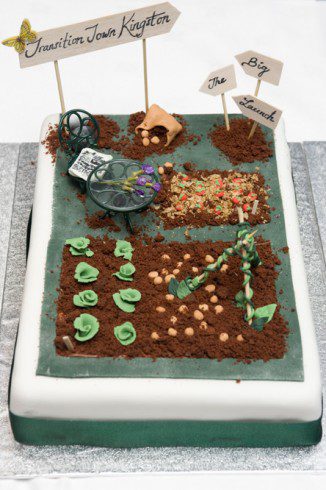
 Closeups of the magnificent cake
Closeups of the magnificent cake
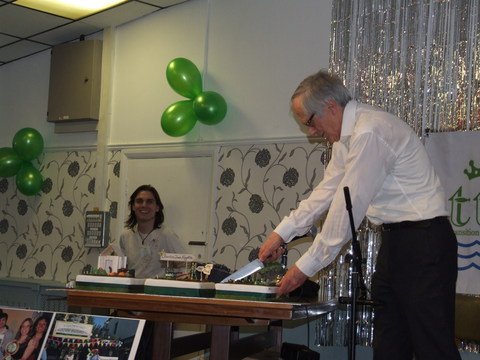 David Fleming does the honours
David Fleming does the honours
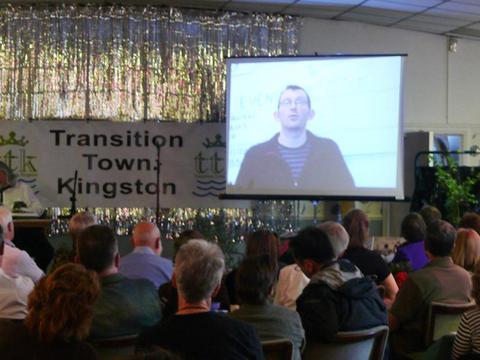 Rob Hopkins' video message
Rob Hopkins' video message
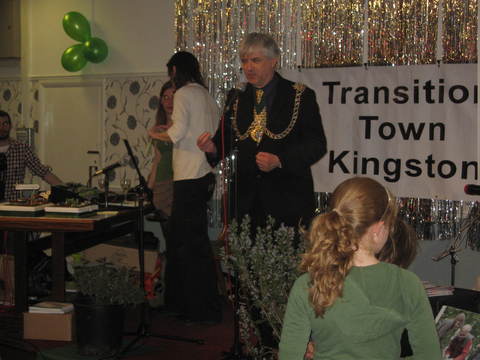 Kingston's Mayor addresses the crowd
Kingston's Mayor addresses the crowd
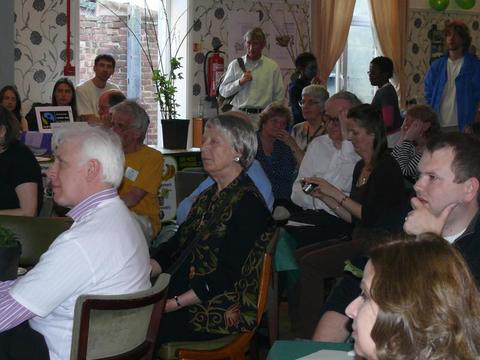
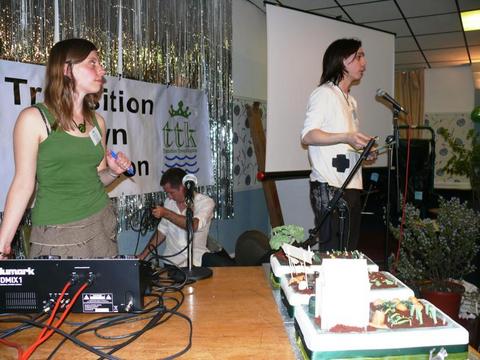 Organising the Open Space, raffle etc.
Organising the Open Space, raffle etc.

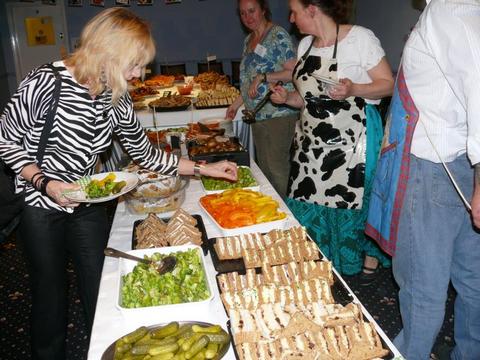 The fantastic spread put on by Toni Izard and family
The fantastic spread put on by Toni Izard and family

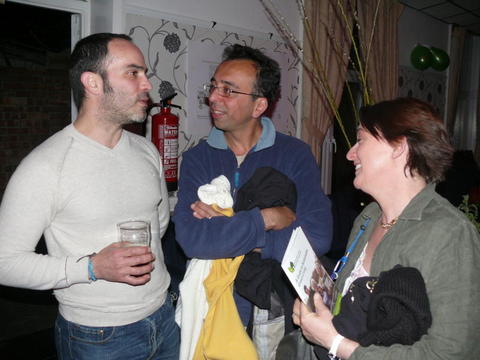
 Prisca Baron singing
Prisca Baron singing
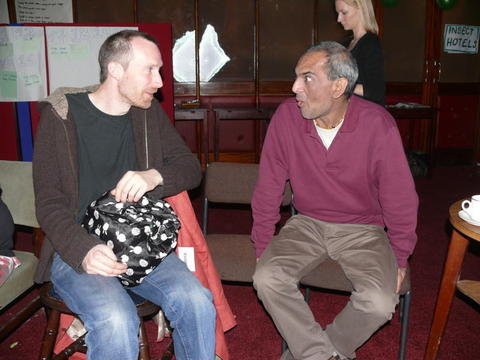
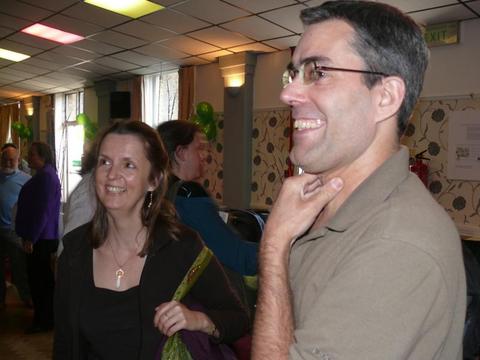 Visitors from other Transition initiatives
Visitors from other Transition initiatives
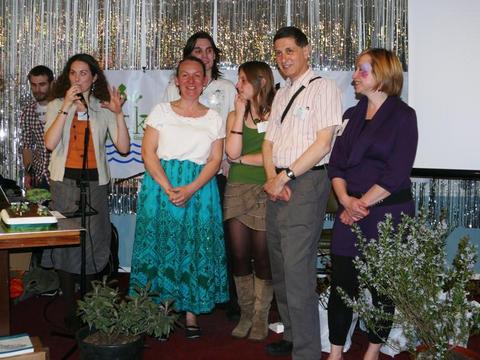
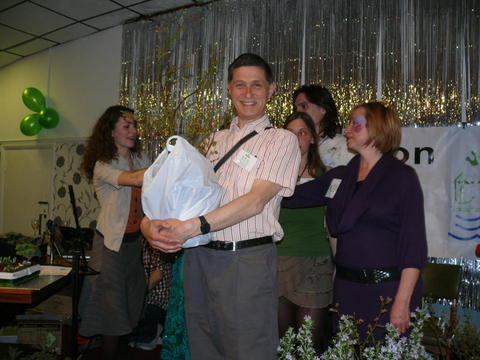 TTK give a gift to the Steering Group - thanks all!
TTK give a gift to the Steering Group - thanks all!
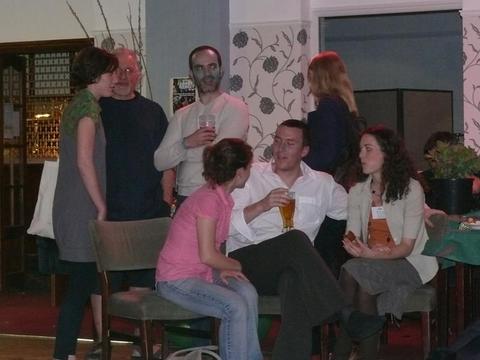
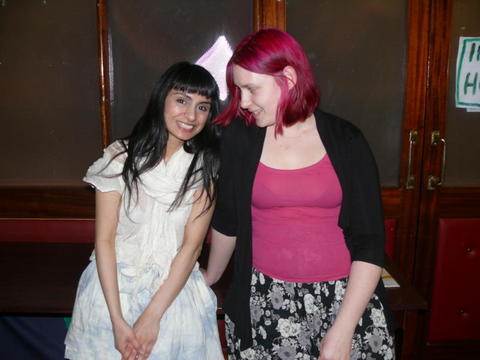 Libby and Maria - two of the cake conjurers!
Libby and Maria - two of the cake conjurers!

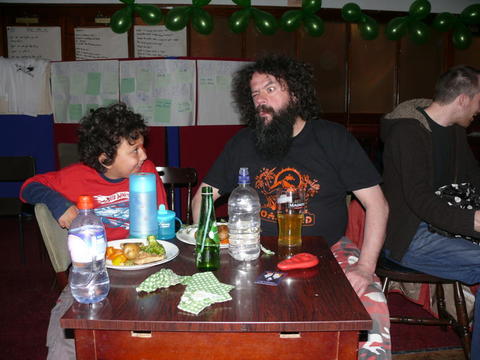
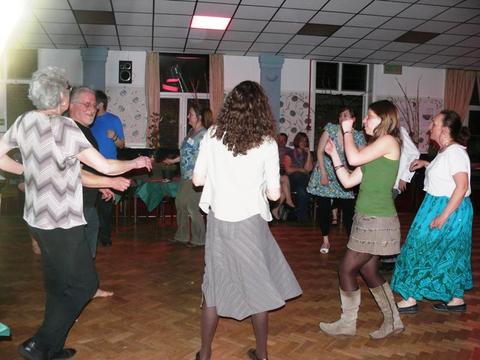 Dancing late into the night
Dancing late into the night
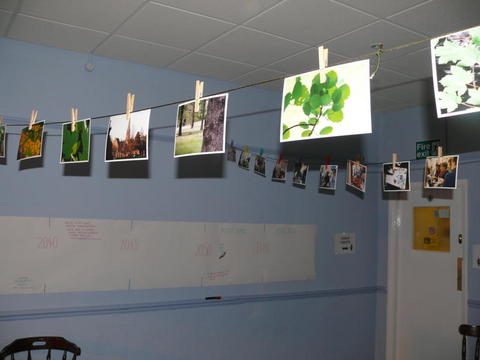
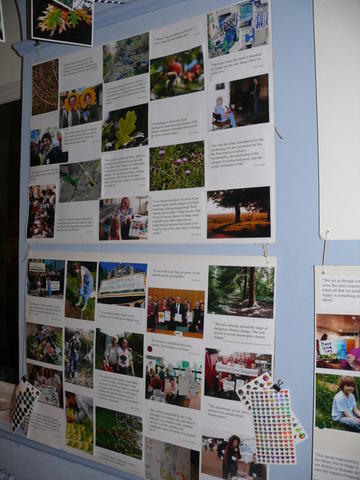 Photos from TTK's history to date, mixed with relevant and inspiring quotes
Photos from TTK's history to date, mixed with relevant and inspiring quotes
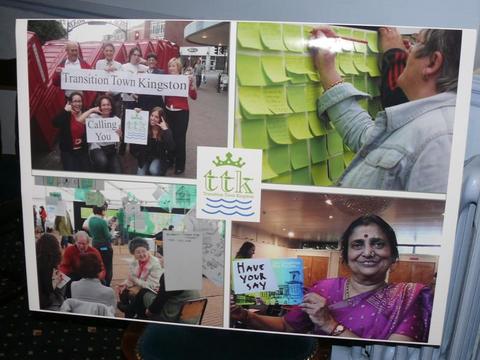
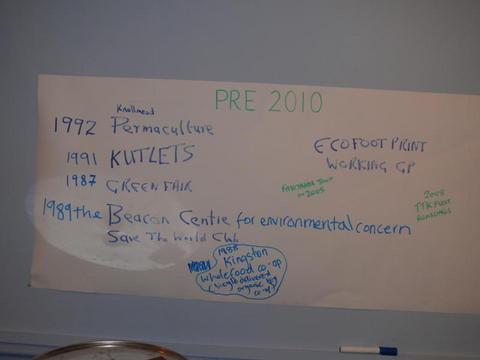
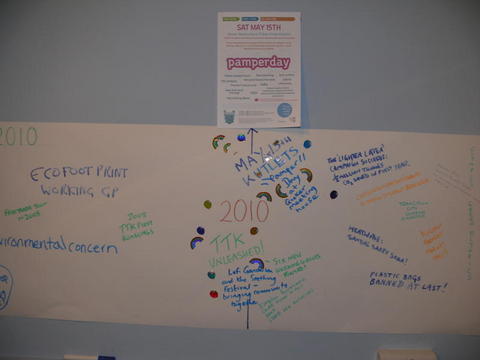
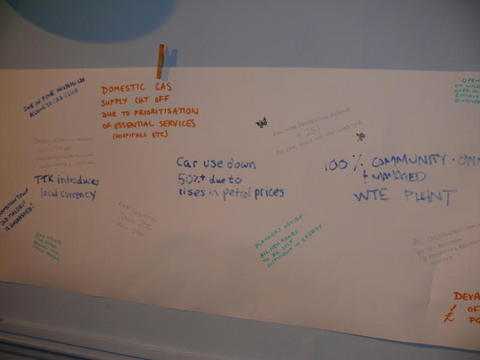
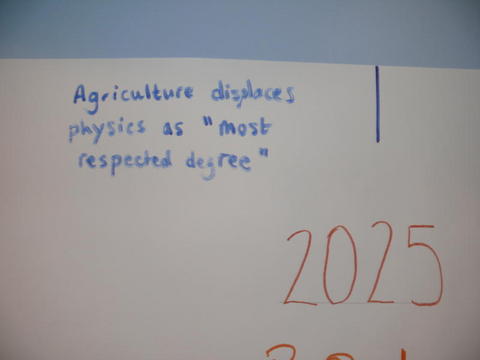
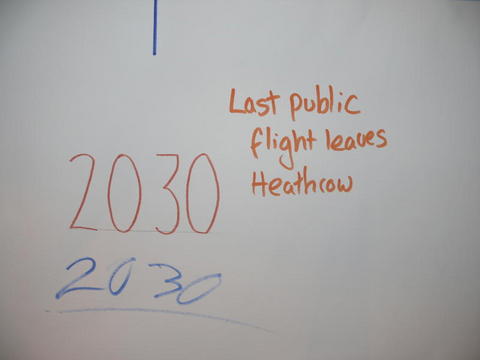
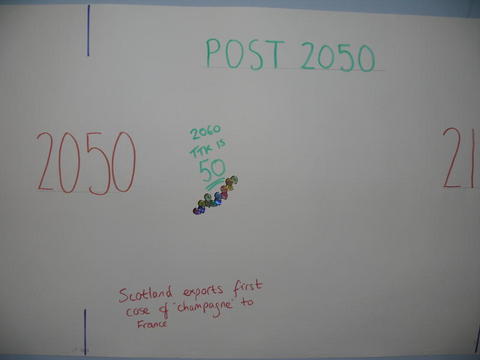 The Kingston timeline, created by Big Launch attendees
The Kingston timeline, created by Big Launch attendees
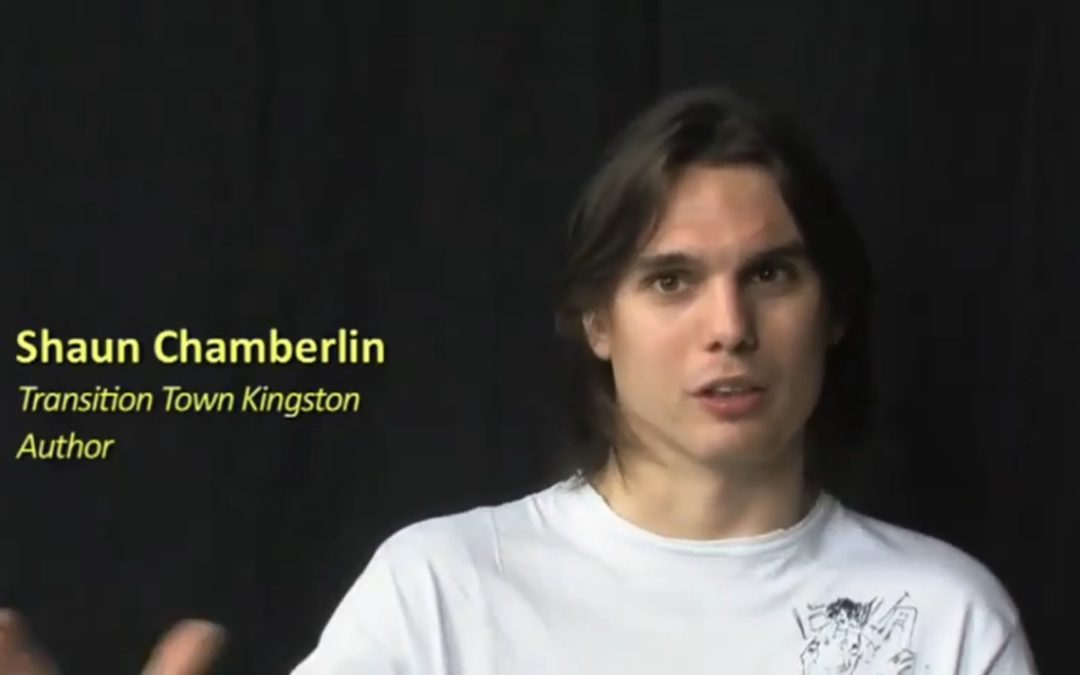
by Shaun Chamberlin | Jan 31, 2010 | All Posts, Cultural stories, Transition Movement
So here it is, the final proof that all Transitioners (me included) have been brainwashed to think alike! Two other vids, and an explanation of where they all came from, below the cut.
Transition: What's that all about then?
What's your 'Transition Vision'?
These three videos were made by Andreas Teuchert via a simple process. He roamed the 2009 Transition Conference, pouncing on unsuspecting passers by and dragging us into a dark room to point a camera at us and probe us with questions. Then he took the footage away and edited it up into the finished videos you see before you. Good work!
For those who may be interested in attending, details of this year's Transition Conference(s) can be found here.
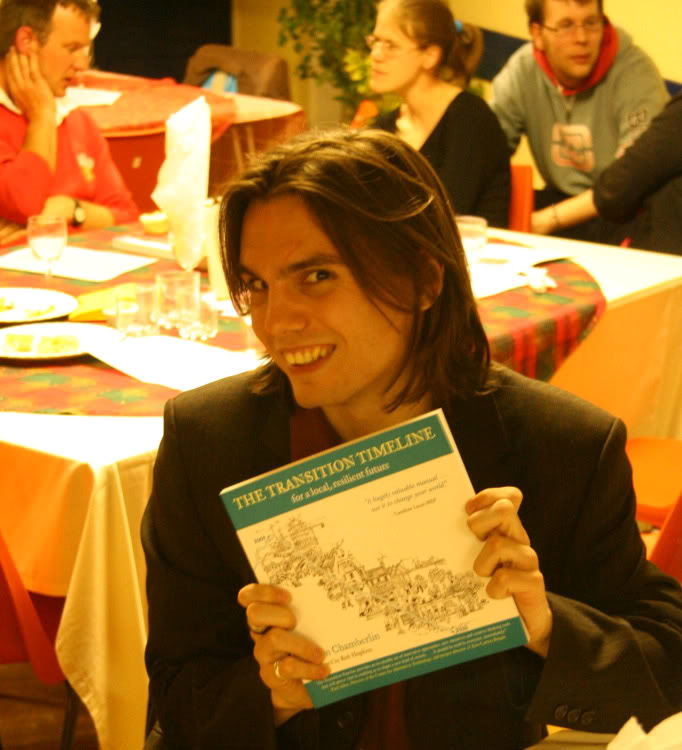
by Shaun Chamberlin | Jun 4, 2009 | All Posts, Climate Change, Cultural stories, Favourite posts, Peak Oil, Politics, Reviews and recommendations, TEQs (Tradable Energy Quotas), The Transition Timeline, Transition Movement
It has been another crazy whirlwind of a month, with this weekend set to be the first in five which I get to spend in Transition Town Home, having spoken recently in Bungay, Glastonbury, Belsize Park and the Forest of Dean, as well at the Transition Conference (I hate that name, can't we call it a 'Gathering' or something?) in Battersea, and at the Sunrise Celebration Festival.
One highlight for me was watching the world première of the movie "In Transition" and being surprised and delighted to find that I was in it (having completely forgotten the quick interview they grabbed with me at my book launch!). Another was meeting an A-Level teacher who is already using my book as a teaching aid for his Environmental Design students.
But perhaps of wider interest was the fact that Ed Miliband, Secretary of State for Energy and Climate Change, turned up at the Transition Conference as a 'keynote listener', but still managed to drop a few bombshells.
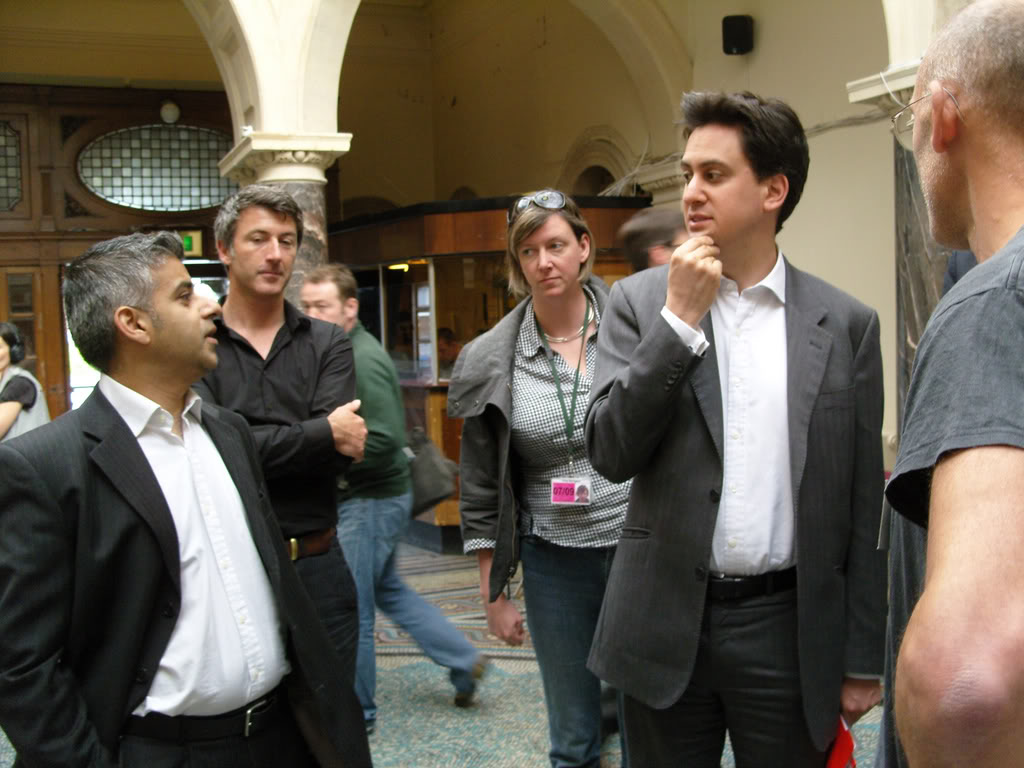 When we buttonholed him for a bit of a chat (audio here, courtesy of Traydio.com), I was pleased to hear that he understood the need for Government to remain a step removed from the Transition movement in order to avoid "strangling" it. However, I must confess I had to refrain from gasping as he declared that:
"If you think about the history of the debate on peak oil as I understand it, climate change makes debate about peak oil a bit of a second-order debate, because we have to start making the transition to low carbon forms of energy in any case. Whether you think that peak oil's in 2020, 2030 or 2040... I don't need to have the debate about peak oil... to know that we have to start making the transition as quickly as possible."
Where to begin? Clearly Ed's understanding of the history of the peak oil debate differs a little from mine. Let's start with the obvious - with many experts agreeing that we likely saw peak oil last year, for our Minister for Energy to be pondering how many decades in the future it might lie is, frankly, terrifying.
But what I personally find even more worrying is that he (and thus presumably his department) has not yet grasped that climate change and peak oil often pull in opposite directions. Perhaps Ed should cast his eyes across the Atlantic to the US Congress, where the advocates of Climate Change Bills (to implement strict carbon budgets) are doing battle with the champions of Energy Independence Bills (to subsidise carbon-intensive tar sands and coal-to-liquids projects).
When we buttonholed him for a bit of a chat (audio here, courtesy of Traydio.com), I was pleased to hear that he understood the need for Government to remain a step removed from the Transition movement in order to avoid "strangling" it. However, I must confess I had to refrain from gasping as he declared that:
"If you think about the history of the debate on peak oil as I understand it, climate change makes debate about peak oil a bit of a second-order debate, because we have to start making the transition to low carbon forms of energy in any case. Whether you think that peak oil's in 2020, 2030 or 2040... I don't need to have the debate about peak oil... to know that we have to start making the transition as quickly as possible."
Where to begin? Clearly Ed's understanding of the history of the peak oil debate differs a little from mine. Let's start with the obvious - with many experts agreeing that we likely saw peak oil last year, for our Minister for Energy to be pondering how many decades in the future it might lie is, frankly, terrifying.
But what I personally find even more worrying is that he (and thus presumably his department) has not yet grasped that climate change and peak oil often pull in opposite directions. Perhaps Ed should cast his eyes across the Atlantic to the US Congress, where the advocates of Climate Change Bills (to implement strict carbon budgets) are doing battle with the champions of Energy Independence Bills (to subsidise carbon-intensive tar sands and coal-to-liquids projects).
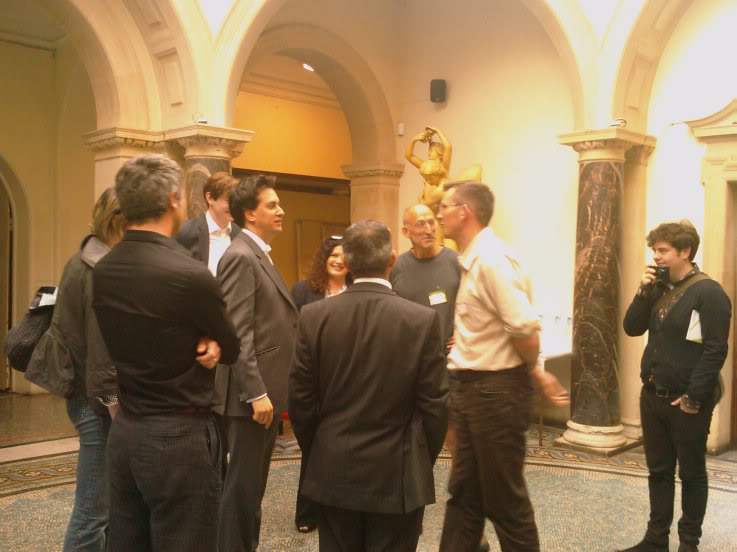 As I wrote here last year, and more recently in The Transition Timeline, there is a very real tension between addressing climate change and addressing peak oil, and policy based purely on one side of this equation could be very destructive indeed. Unfortunately, our government is still caught on the horns of this 'supply side dilemma', and is desperately casting around for more rapidly-deployable low-carbon energy supplies.
It is only slowly dawning on them that renewable supply cannot increase as fast as oil and gas are declining, that nuclear only makes the problem worse, and that coal is not an option if we want a habitable planet. The inescapable conclusion is that if we are to treat climate change with the seriousness which it undoubtedly deserves, then we may well have already entered our years of energy descent. The only reasonable response is to find ways to thrive in this context - to reduce energy demand in line with the reducing supply - but as yet Ed still believes that only Denial sells to the voting public:
"In a way I'm less optimistic than you are... you're optimistic that you can persuade people to adopt a sort of "no growth" model of society - I'm pretty convinced that you couldn't persuade people of that... Even if you were right about your model of society, I just don't believe that you're going to convince people of that"
Actually, I do agree with Ed that we need to think long and hard about what "economic growth" actually means before we debate whether we want it, though I'm not sure we'll see eye-to-eye when that debate reaches its head.
Of course it doesn't come as an overwhelming surprise to see my perspective deemed darker yet more optimistic than the Government view, but since the Transition Vision of the future seems about the only desirable outcome out there to shoot for, I think I'll just keep right on shooting, whether Ed rates our chances or not.
Having said that, with Rob's recent post on 'burn out' in mind, it's definitely time for a day off for me. Tomorrow is my birthday, and I will be taking a hard-earned breather at Kew Gardens with my beautiful and inspirational girlfriend. Back soon!
As I wrote here last year, and more recently in The Transition Timeline, there is a very real tension between addressing climate change and addressing peak oil, and policy based purely on one side of this equation could be very destructive indeed. Unfortunately, our government is still caught on the horns of this 'supply side dilemma', and is desperately casting around for more rapidly-deployable low-carbon energy supplies.
It is only slowly dawning on them that renewable supply cannot increase as fast as oil and gas are declining, that nuclear only makes the problem worse, and that coal is not an option if we want a habitable planet. The inescapable conclusion is that if we are to treat climate change with the seriousness which it undoubtedly deserves, then we may well have already entered our years of energy descent. The only reasonable response is to find ways to thrive in this context - to reduce energy demand in line with the reducing supply - but as yet Ed still believes that only Denial sells to the voting public:
"In a way I'm less optimistic than you are... you're optimistic that you can persuade people to adopt a sort of "no growth" model of society - I'm pretty convinced that you couldn't persuade people of that... Even if you were right about your model of society, I just don't believe that you're going to convince people of that"
Actually, I do agree with Ed that we need to think long and hard about what "economic growth" actually means before we debate whether we want it, though I'm not sure we'll see eye-to-eye when that debate reaches its head.
Of course it doesn't come as an overwhelming surprise to see my perspective deemed darker yet more optimistic than the Government view, but since the Transition Vision of the future seems about the only desirable outcome out there to shoot for, I think I'll just keep right on shooting, whether Ed rates our chances or not.
Having said that, with Rob's recent post on 'burn out' in mind, it's definitely time for a day off for me. Tomorrow is my birthday, and I will be taking a hard-earned breather at Kew Gardens with my beautiful and inspirational girlfriend. Back soon!

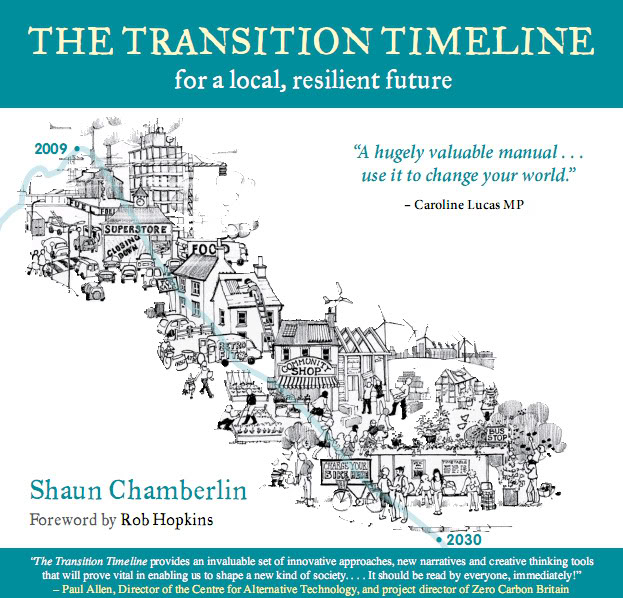
by Shaun Chamberlin | Apr 15, 2009 | All Posts, Favourite posts, Reviews and recommendations, The Transition Timeline, Transition Movement
The last month has been a bit of a blur, with very well-attended book launch events all over Britain, a two-day seminar at the Centre for Alternative Technology scoping out Zero Carbon Britain 2, more radio interviews, and even being caught on film for the first time (more practice required methinks!).
While I've been zipping around, a number of people have requested a more detailed write-up on The Transition Timeline than I have so far provided online, so let's take a closer look.
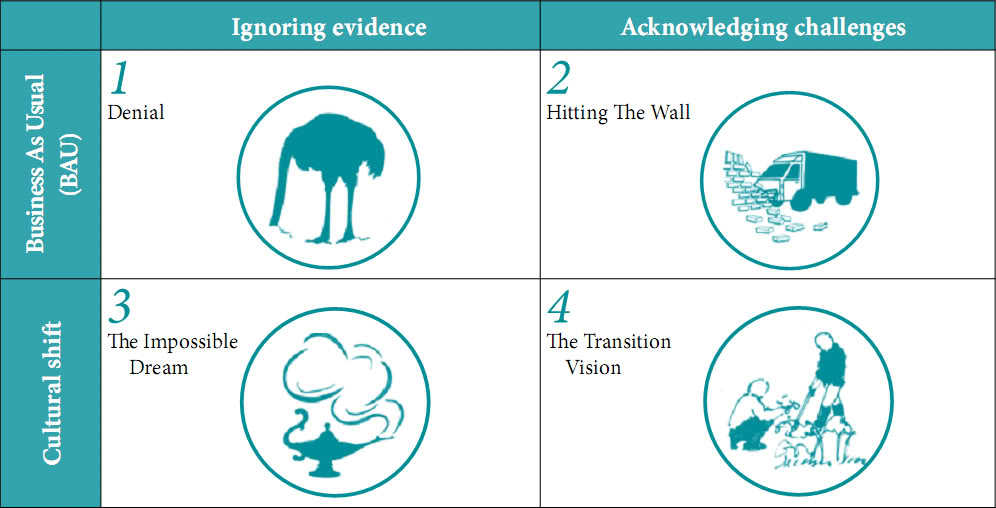 In overview, then, the first half of the book explores four different visions of how the next twenty years could pan out for the UK and world, before focusing on what might be considered the most desirable of these, the Transition Vision, and examining the practical details of this in depth. There is also a chapter here provided by Rob Hopkins, the originator of the Transition movement, in which he outlines the progress Transition initiatives have made to date, and provides a set of tools for communities working towards their local Energy Descent Action Plans (a key aspect of the Transition process).
The second half of the book provides a thoroughly researched yet readable exploration of the latest evidence and thinking on climate change and peak oil, and the interactions between the two, including a section focused on their present and future impacts in the UK, and on our Government's responses to date.
In overview, then, the first half of the book explores four different visions of how the next twenty years could pan out for the UK and world, before focusing on what might be considered the most desirable of these, the Transition Vision, and examining the practical details of this in depth. There is also a chapter here provided by Rob Hopkins, the originator of the Transition movement, in which he outlines the progress Transition initiatives have made to date, and provides a set of tools for communities working towards their local Energy Descent Action Plans (a key aspect of the Transition process).
The second half of the book provides a thoroughly researched yet readable exploration of the latest evidence and thinking on climate change and peak oil, and the interactions between the two, including a section focused on their present and future impacts in the UK, and on our Government's responses to date.
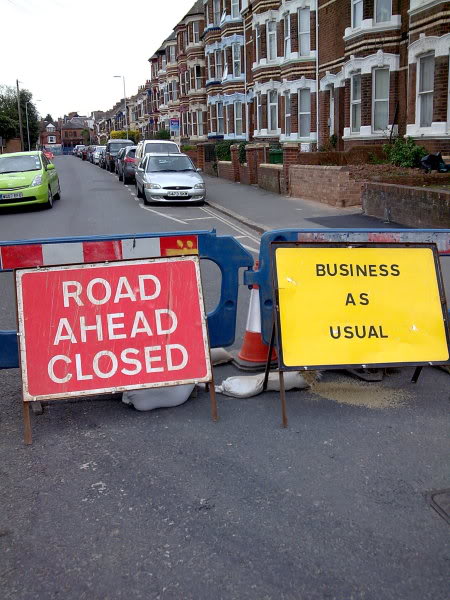 The book itself initially grew out of three motivations. Firstly, it was requested by existing Transition initiatives, who were trying to produce realistic positive visions of the future for their communities, but needed some input on the major trends facing the UK in our near-future – the kinds of things which are going to affect them but which may be hard for individual communities to directly affect (e.g. peak oil, government policy or UK food supply). Accordingly, the book provides a readable summary of the existing research in key areas of concern (e.g. population, food and water, energy, healthcare...), outlining the present position and trends before exploring possible futures.
The second impetus for the book was my personal concern about whether the Transition process is adequate to dealing with the sheer scale of the challenges we collectively face. This is a theme that runs throughout the book, as the process of writing was intimately bound up with my own exploration of this.
The final energy behind the book's creation was the desire to flesh out the Transition Vision. This concept was touched on in Rob's Transition Handbook, but Rob and I felt strongly that it needed to be developed further. Core to Transition is the idea that we need a positive realistic vision of the future to get us all out of bed in the morning, and I was very keen to make this feel more tangible and real by exploring the possibilities and challenges in more detail.
The book itself initially grew out of three motivations. Firstly, it was requested by existing Transition initiatives, who were trying to produce realistic positive visions of the future for their communities, but needed some input on the major trends facing the UK in our near-future – the kinds of things which are going to affect them but which may be hard for individual communities to directly affect (e.g. peak oil, government policy or UK food supply). Accordingly, the book provides a readable summary of the existing research in key areas of concern (e.g. population, food and water, energy, healthcare...), outlining the present position and trends before exploring possible futures.
The second impetus for the book was my personal concern about whether the Transition process is adequate to dealing with the sheer scale of the challenges we collectively face. This is a theme that runs throughout the book, as the process of writing was intimately bound up with my own exploration of this.
The final energy behind the book's creation was the desire to flesh out the Transition Vision. This concept was touched on in Rob's Transition Handbook, but Rob and I felt strongly that it needed to be developed further. Core to Transition is the idea that we need a positive realistic vision of the future to get us all out of bed in the morning, and I was very keen to make this feel more tangible and real by exploring the possibilities and challenges in more detail.
 This importance of this was reinforced for me mid-way through the drafting process when the Age of Stupid team brought a sneak preview of their film to the Transition Conference last year. The response was generally that it was a brilliant film, but that it was still focused on the "Denial" scenario and the awful places that could lead, without showing the audience the positive alternative.
Franny Armstrong, the film's director, agreed, and challenged us to flesh out that alternative vision to set alongside her film, so that people could clearly perceive the real choices we face. Those discussions stayed with me throughout the drafting process, and ultimately led to the tie-in between the launch of the film and the book, and Franny's comment that: "There is obviously no single, magic bullet solution to climate change. But if I was forced to choose one – our best hope of averting the crisis – it would definitely be Transition Towns."
This importance of this was reinforced for me mid-way through the drafting process when the Age of Stupid team brought a sneak preview of their film to the Transition Conference last year. The response was generally that it was a brilliant film, but that it was still focused on the "Denial" scenario and the awful places that could lead, without showing the audience the positive alternative.
Franny Armstrong, the film's director, agreed, and challenged us to flesh out that alternative vision to set alongside her film, so that people could clearly perceive the real choices we face. Those discussions stayed with me throughout the drafting process, and ultimately led to the tie-in between the launch of the film and the book, and Franny's comment that: "There is obviously no single, magic bullet solution to climate change. But if I was forced to choose one – our best hope of averting the crisis – it would definitely be Transition Towns."
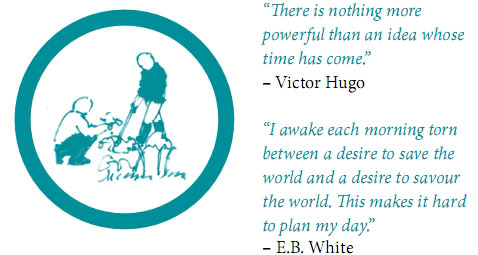 The Transition Vision we developed, then, is of a future in which we create a resilient, more localised society which avoids the worst potential of climate change and peak oil through building thriving lower-energy communities teeming with satisfying lifestyles and fulfilled people.
In the book I track this vision through a 'history of the next twenty years', examining population, demographics, food, water, energy, transport and healthcare, and then drawing together the common threads which appear to run through our near-future in all of these areas.
I should emphasise at this point that as the author I make no claim to any 'ownership' of this vision or timeline. It was developed in collaboration with as many Transitioners as I could manage to speak to, and represents and supports the learning and practical progress of the Transition movement as it continues to spread and mature. Now that I have pulled together a first draft, the never-ending process of developing the vision of the future we want to co-create for our communities and world is intended to continue as a collaborative project. This has already begun over at the Transition Forums, and in the near-future we plan to put the content of my book up on Appropedia, so that as many people as possible can collaborate in developing the second edition, just as has already been done with The Transition Handbook. We need as many heads, hearts and hands as possible working on our best responses to this unprecedented historical situation.
For me personally, one thing that has come out of the many long train journeys that I have taken this month has been a chance to actually read my own book! That may sound strange, but I found it is a very different experience to approach the book as a general reader than as a writer, proofreader etc. From this new perspective it seemed to me that the graph reproduced below represents perhaps the core shift in cultural perspective underlying the Transition Vision - that there is not a simple direct relationship between consumption and fulfilment.
The Transition Vision we developed, then, is of a future in which we create a resilient, more localised society which avoids the worst potential of climate change and peak oil through building thriving lower-energy communities teeming with satisfying lifestyles and fulfilled people.
In the book I track this vision through a 'history of the next twenty years', examining population, demographics, food, water, energy, transport and healthcare, and then drawing together the common threads which appear to run through our near-future in all of these areas.
I should emphasise at this point that as the author I make no claim to any 'ownership' of this vision or timeline. It was developed in collaboration with as many Transitioners as I could manage to speak to, and represents and supports the learning and practical progress of the Transition movement as it continues to spread and mature. Now that I have pulled together a first draft, the never-ending process of developing the vision of the future we want to co-create for our communities and world is intended to continue as a collaborative project. This has already begun over at the Transition Forums, and in the near-future we plan to put the content of my book up on Appropedia, so that as many people as possible can collaborate in developing the second edition, just as has already been done with The Transition Handbook. We need as many heads, hearts and hands as possible working on our best responses to this unprecedented historical situation.
For me personally, one thing that has come out of the many long train journeys that I have taken this month has been a chance to actually read my own book! That may sound strange, but I found it is a very different experience to approach the book as a general reader than as a writer, proofreader etc. From this new perspective it seemed to me that the graph reproduced below represents perhaps the core shift in cultural perspective underlying the Transition Vision - that there is not a simple direct relationship between consumption and fulfilment.
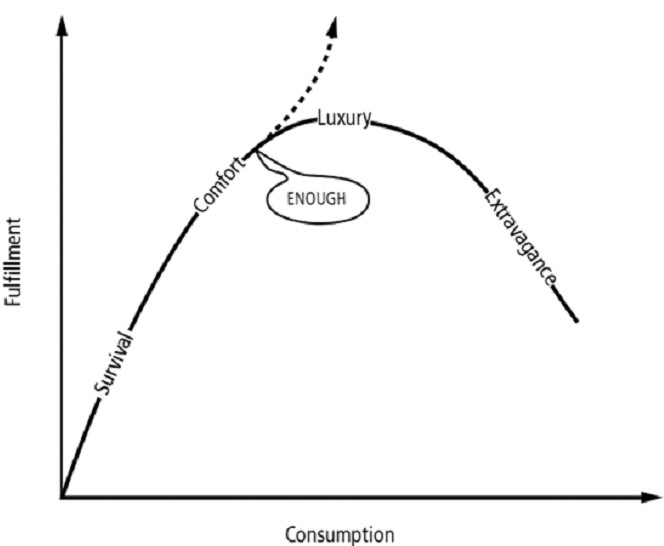 Reading through, and relying on my earlier research legwork, I found it was easy enough to trace our society's progression along this curve in each of the areas examined in the book, but what really struck me was the shift in the underlying message of this graph. I originally found the image in the 2002 essay The Great Transition, which in turn credits the 1992 book Your Money or Your Life, and the concepts behind it clearly hold a far longer heritage than that, yet there is a distinctly modern twist. While this graph used to make perhaps a fairly abstract point about the nature of fulfilment and well-being, in our modern world we can recognise that continuing on down the path of ever-greater consumption of energy and material resources now not only leads to lower levels of heartfelt satisfaction, but also to environmental devastation, massive mortality rates and widespread outright misery.
Working on The Transition Timeline has made it ever clearer to me that our choice now is between taking perhaps our last chance to enjoy a far happier, more satisfying world, or experiencing a vastly less desirable one - more of the same simply isn't an option. Here I am put in mind of Paul Wellstone's words, "If we don't fight hard enough for the things we stand for, at some point we have to recognise that we don't really stand for them".
This book was written for those communities who have already taken the brave decision to work for the future we all hope to live in, and I very much hope that it fills its intended role as a key tool supporting them - I feel privileged to have been entrusted with it.
--
Edit - for the range of online reviews and the opportunity to support my work by ordering a signed copy see here.
Reading through, and relying on my earlier research legwork, I found it was easy enough to trace our society's progression along this curve in each of the areas examined in the book, but what really struck me was the shift in the underlying message of this graph. I originally found the image in the 2002 essay The Great Transition, which in turn credits the 1992 book Your Money or Your Life, and the concepts behind it clearly hold a far longer heritage than that, yet there is a distinctly modern twist. While this graph used to make perhaps a fairly abstract point about the nature of fulfilment and well-being, in our modern world we can recognise that continuing on down the path of ever-greater consumption of energy and material resources now not only leads to lower levels of heartfelt satisfaction, but also to environmental devastation, massive mortality rates and widespread outright misery.
Working on The Transition Timeline has made it ever clearer to me that our choice now is between taking perhaps our last chance to enjoy a far happier, more satisfying world, or experiencing a vastly less desirable one - more of the same simply isn't an option. Here I am put in mind of Paul Wellstone's words, "If we don't fight hard enough for the things we stand for, at some point we have to recognise that we don't really stand for them".
This book was written for those communities who have already taken the brave decision to work for the future we all hope to live in, and I very much hope that it fills its intended role as a key tool supporting them - I feel privileged to have been entrusted with it.
--
Edit - for the range of online reviews and the opportunity to support my work by ordering a signed copy see here.
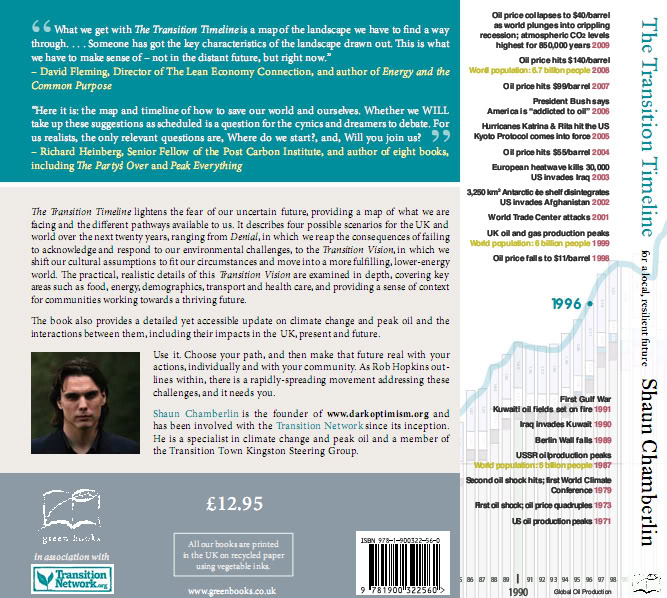 “Peak oil and climate change are two of the greatest challenges we face today; the Transition Town movement is firmly rooted in the idea that people taking action now in their communities can not only tackle these environmental threats but also, in the process of doing so, lead more fulfilling lives. It is about hope in an otherwise bleak seeming future. Above all, it's about the power of an alternative vision for how society could be and not waiting for government or politicians to get it right.
The Transition Timeline is designed to bring that vision to life – with stories of what communities have already achieved, with updates on the latest scientific data, and with ‘maps’ that highlight key landmarks on the journey towards a zero carbon future. It's a hugely valuable manual for anyone committed to turning dreams into reality. Don't just read this book – use it to change your world.”
~ Caroline Lucas MP, leader of the Green Party of England and Wales, and co-author of Green Alternatives to Globalisation: A Manifesto.
--
“Shaun Chamberlin ties down the uncertainties about climate, energy, food, water and population, the big scene-setters of our future, with no-nonsense authority. What we get with The Transition Timeline is a map of the landscape we have to find a way through. Map-making is a risky business: sooner or later someone is going to use your map and come across a treacherous swamp that isn’t marked. So you need to be alert to revisions and reports from travellers. But what matters is that someone has got the key characteristics of the landscape drawn out. This is what we have to make sense of – not in the distant future, but right now.
Don't set out without The Transition Timeline. Take a biro. Scribble updates, comments, expressions of shock and horror, notes to cheer yourself up. By the time your copy has been rained on, stained with blackberry juice, consulted, annotated, used to press and preserve a leaf of our autumnal world, you will have a good idea of where you are, and inspiration about where you are going. It is almost as good as getting there.”
~ Dr. David Fleming, director of The Lean Economy Connection, and author of Energy and the Common Purpose
--
“There is obviously no single, magic bullet solution to climate change. But if I was forced to choose one – our best hope of averting the crisis – it would definitely be Transition Towns.”
~ Franny Armstrong, Director of The Age of Stupid film
--
“Transition has emerged as perhaps the only real model we have for addressing our current crisis – a new, if vital, format for reconsidering our future. The Transition Timeline strengthens a fragile form, something that might, without a trace of irony, be called one of the last, best hopes for all of us.”
~ Sharon Astyk, author of Depletion and Abundance: Life on the New Home Front and A Nation of Farmers: Defeating the Food Crisis on American Soil
--
“Will the future be as rosy as The Transition Timeline suggests it might be? Will the people of Britain and the rest of the world begin immediately to make better decisions, taking the welfare of future generations into account? The answer to both questions is probably no.
Will serious repercussions of decisions already taken (regarding fossil fuel consumption and the structuring of our economy to depend on perpetual growth for its viability) come to bite us hard before we even have a chance to implement some of the excellent recommendations contained in this book? The answer to that one is certainly yes - we are already seeing dire consequences of past economic and energy decisions.
Nevertheless, without a vision of what can be, there is no alternative to a future completely constrained by the past. The ideal future set forth herein is not a useless pipe-dream. There is not a single outcome described in this book that could not realistically be achieved IF we all do things beginning now that are entirely within our ability to do.
So here it is: the map and timeline of how to save our world and ourselves. Whether we WILL take up these suggestions as scheduled is a question for the cynics and dreamers to debate. For us realists, the only relevant questions are, Where do we start?, and, Will you join us? ”
~ Richard Heinberg, Senior fellow of the Post Carbon Institute, and author of eight books, including The Party’s Over and Peak Everything
--
“The next 100 months will be a very special time for humanity. On numerous fronts, the consequences of the past 150 years of industrialisation are all simultaneously coming home to roost. Even senior experts, scientists, NGOs and political leaders fail to appreciate that the most recent evidence reveals a situation more urgent than had been expected, even by those who have been following it closely for decades. The Transition Timeline provides an invaluable set of innovative approaches, new narratives and creative thinking tools that will prove vital in enabling us to shape a new kind of society and a new kind of economy; stable in the long term, locally resilient, but still active in a global context, rich in quality jobs, a strong sense of purpose and reliant on indigenous, in-exhaustible energy. It should be read by everyone, immediately!”
~ Paul Allen, director of the Centre for Alternative Technology, and project director of Zero Carbon Britain
“Peak oil and climate change are two of the greatest challenges we face today; the Transition Town movement is firmly rooted in the idea that people taking action now in their communities can not only tackle these environmental threats but also, in the process of doing so, lead more fulfilling lives. It is about hope in an otherwise bleak seeming future. Above all, it's about the power of an alternative vision for how society could be and not waiting for government or politicians to get it right.
The Transition Timeline is designed to bring that vision to life – with stories of what communities have already achieved, with updates on the latest scientific data, and with ‘maps’ that highlight key landmarks on the journey towards a zero carbon future. It's a hugely valuable manual for anyone committed to turning dreams into reality. Don't just read this book – use it to change your world.”
~ Caroline Lucas MP, leader of the Green Party of England and Wales, and co-author of Green Alternatives to Globalisation: A Manifesto.
--
“Shaun Chamberlin ties down the uncertainties about climate, energy, food, water and population, the big scene-setters of our future, with no-nonsense authority. What we get with The Transition Timeline is a map of the landscape we have to find a way through. Map-making is a risky business: sooner or later someone is going to use your map and come across a treacherous swamp that isn’t marked. So you need to be alert to revisions and reports from travellers. But what matters is that someone has got the key characteristics of the landscape drawn out. This is what we have to make sense of – not in the distant future, but right now.
Don't set out without The Transition Timeline. Take a biro. Scribble updates, comments, expressions of shock and horror, notes to cheer yourself up. By the time your copy has been rained on, stained with blackberry juice, consulted, annotated, used to press and preserve a leaf of our autumnal world, you will have a good idea of where you are, and inspiration about where you are going. It is almost as good as getting there.”
~ Dr. David Fleming, director of The Lean Economy Connection, and author of Energy and the Common Purpose
--
“There is obviously no single, magic bullet solution to climate change. But if I was forced to choose one – our best hope of averting the crisis – it would definitely be Transition Towns.”
~ Franny Armstrong, Director of The Age of Stupid film
--
“Transition has emerged as perhaps the only real model we have for addressing our current crisis – a new, if vital, format for reconsidering our future. The Transition Timeline strengthens a fragile form, something that might, without a trace of irony, be called one of the last, best hopes for all of us.”
~ Sharon Astyk, author of Depletion and Abundance: Life on the New Home Front and A Nation of Farmers: Defeating the Food Crisis on American Soil
--
“Will the future be as rosy as The Transition Timeline suggests it might be? Will the people of Britain and the rest of the world begin immediately to make better decisions, taking the welfare of future generations into account? The answer to both questions is probably no.
Will serious repercussions of decisions already taken (regarding fossil fuel consumption and the structuring of our economy to depend on perpetual growth for its viability) come to bite us hard before we even have a chance to implement some of the excellent recommendations contained in this book? The answer to that one is certainly yes - we are already seeing dire consequences of past economic and energy decisions.
Nevertheless, without a vision of what can be, there is no alternative to a future completely constrained by the past. The ideal future set forth herein is not a useless pipe-dream. There is not a single outcome described in this book that could not realistically be achieved IF we all do things beginning now that are entirely within our ability to do.
So here it is: the map and timeline of how to save our world and ourselves. Whether we WILL take up these suggestions as scheduled is a question for the cynics and dreamers to debate. For us realists, the only relevant questions are, Where do we start?, and, Will you join us? ”
~ Richard Heinberg, Senior fellow of the Post Carbon Institute, and author of eight books, including The Party’s Over and Peak Everything
--
“The next 100 months will be a very special time for humanity. On numerous fronts, the consequences of the past 150 years of industrialisation are all simultaneously coming home to roost. Even senior experts, scientists, NGOs and political leaders fail to appreciate that the most recent evidence reveals a situation more urgent than had been expected, even by those who have been following it closely for decades. The Transition Timeline provides an invaluable set of innovative approaches, new narratives and creative thinking tools that will prove vital in enabling us to shape a new kind of society and a new kind of economy; stable in the long term, locally resilient, but still active in a global context, rich in quality jobs, a strong sense of purpose and reliant on indigenous, in-exhaustible energy. It should be read by everyone, immediately!”
~ Paul Allen, director of the Centre for Alternative Technology, and project director of Zero Carbon Britain
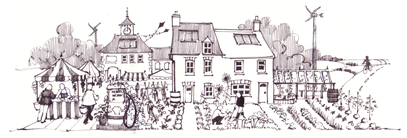
by Shaun Chamberlin | Dec 7, 2008 | All Posts, Cultural stories, The Transition Timeline, Transition Movement
Last month I discussed some of the national and international developments that are shaping our future, but in spite of the ongoing climate talks in Poznan, today I'd like to focus on the importance of local-level action.
Amidst all the focus on global climate agreements it's easy to forget that agreeing a tightening global cap on emissions is not a solution in itself - such a cap would be meaningless without on-the-ground solutions and lifestyle changes at the local and individual levels. This is why I see the tremendously rapid spread of the Transition movement as such a hopeful sign.
It is only two years ago that Rob Hopkins was explaining this new concept to around twenty of us down at Schumacher College and wondering where it might go, yet here we are in 2008 with 120 official Transition initiatives around the world and almost 1,000 more who have made contact to say that they are considering getting involved.
Here in Kingston the first meeting to discuss the idea was held in May this year, and we became an official Transition initiative in August. We are now holding regular events and have six action groups working to raise awareness of climate change, peak oil and the Transition movement in our local community.
For me personally the sense of being supported as a member of the team is invaluable. I will admit to an unfortunate predisposition to take projects away and work on them on my own, and regular meetings with my fellow Transitioners provide a vital antidote.
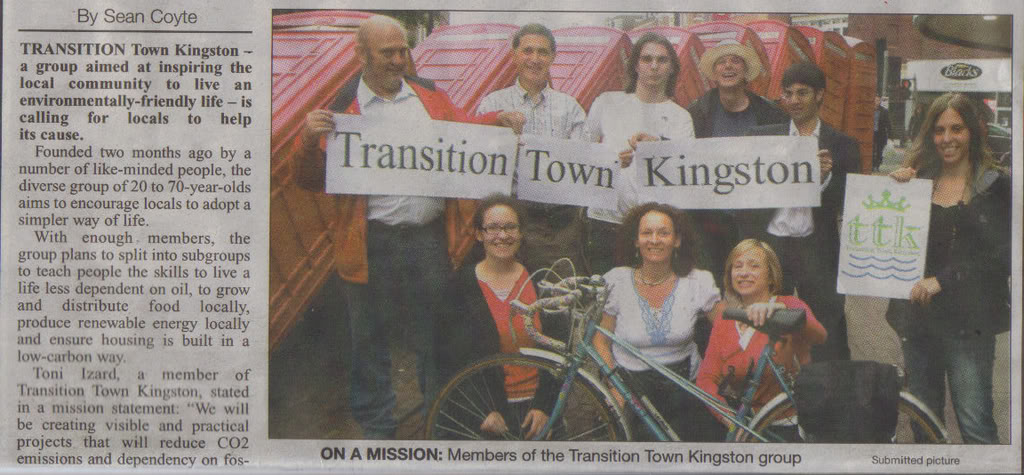 This week we marked six months since the genesis of Transition Town Kingston (TTK) with a talk by Dr. David Fleming on the theme of 'Transition Carnival', discussing his impressive research on the critical importance of wild parties to the development of resilient communities!
Our efforts to heed his advice may have been less raucous than his ideal, but his wonderful talk brought home the sense that the significance of the Transition movement runs deeper than its essential role in a sufficient response to 'Peak Climate' or its apparent power to strengthen community ties - deeper even than the fine excuse it provides for good times.
The true test of its influence will lie in its contribution to shifting the cultural stories which have led us to this Last Chance Saloon. As I emphasise in my forthcoming book The Transition Timeline, our individual and collective decisions about what is important to us will determine our future. I hope that the legacy of the Transition movement will be to play its part in empowering us to choose anew. I am fortunate and proud to be a part of it.
This week we marked six months since the genesis of Transition Town Kingston (TTK) with a talk by Dr. David Fleming on the theme of 'Transition Carnival', discussing his impressive research on the critical importance of wild parties to the development of resilient communities!
Our efforts to heed his advice may have been less raucous than his ideal, but his wonderful talk brought home the sense that the significance of the Transition movement runs deeper than its essential role in a sufficient response to 'Peak Climate' or its apparent power to strengthen community ties - deeper even than the fine excuse it provides for good times.
The true test of its influence will lie in its contribution to shifting the cultural stories which have led us to this Last Chance Saloon. As I emphasise in my forthcoming book The Transition Timeline, our individual and collective decisions about what is important to us will determine our future. I hope that the legacy of the Transition movement will be to play its part in empowering us to choose anew. I am fortunate and proud to be a part of it.


 Next, local inspiration Robin Hutchinson entertainingly introduced talks from our local MPs (although this close to the election he had to describe them as "Parliamentary candidates who you may remember from their previous jobs"!), our mayor, the head of the Council, me and the ever-entertaining David Fleming, back by popular demand, who hesitated to despoil the cake by doing us the honour of cutting it.
Next, local inspiration Robin Hutchinson entertainingly introduced talks from our local MPs (although this close to the election he had to describe them as "Parliamentary candidates who you may remember from their previous jobs"!), our mayor, the head of the Council, me and the ever-entertaining David Fleming, back by popular demand, who hesitated to despoil the cake by doing us the honour of cutting it.
 We also received a congratulatory video message from Rob Hopkins before a planned Open Space session, in which we faced the real challenge of getting everyone to stop having passionate, deeply involved conversations long enough so that we could explain to them how wonderfully Open Space could facilitate such conversations.
With Prisca Baron singing to a rapt audience of children and adults alike, DJ Matt providing the soundtrack late into the night and Toni Izard and family laying on an amazing spread of food and refreshments, it felt like a real triumph of community spirit, with smiles on the faces of old stalwarts and total newcomers alike.
We also received a congratulatory video message from Rob Hopkins before a planned Open Space session, in which we faced the real challenge of getting everyone to stop having passionate, deeply involved conversations long enough so that we could explain to them how wonderfully Open Space could facilitate such conversations.
With Prisca Baron singing to a rapt audience of children and adults alike, DJ Matt providing the soundtrack late into the night and Toni Izard and family laying on an amazing spread of food and refreshments, it felt like a real triumph of community spirit, with smiles on the faces of old stalwarts and total newcomers alike.
 I didn't manage to get a handle on the numbers there (perhaps 250??), but it was great to see so many unfamiliar faces mingling happily, and contributing to the Kingston Timeline that we pinned to the wall (see some of the ideas it produced here).
Even the venue itself felt like a new ally, as almost everyone attending had never set foot in Kingston Working Men's Club before, despite its location tucked away right in the heart of Kingston. A great many more people know it's there now, and hopefully a few lasting connections have been forged.
For me personally, the two particular highlights in a night of delights were the deliciously brilliant (and brilliantly delicious!) cake - or actually three cakes - and the TTK movie. Credit for the first, and for the photos featured here, goes to our talented trio Libby, Jonny and Maria, AKA Caking Agent.
I didn't manage to get a handle on the numbers there (perhaps 250??), but it was great to see so many unfamiliar faces mingling happily, and contributing to the Kingston Timeline that we pinned to the wall (see some of the ideas it produced here).
Even the venue itself felt like a new ally, as almost everyone attending had never set foot in Kingston Working Men's Club before, despite its location tucked away right in the heart of Kingston. A great many more people know it's there now, and hopefully a few lasting connections have been forged.
For me personally, the two particular highlights in a night of delights were the deliciously brilliant (and brilliantly delicious!) cake - or actually three cakes - and the TTK movie. Credit for the first, and for the photos featured here, goes to our talented trio Libby, Jonny and Maria, AKA Caking Agent.
 The second was the work of Elise Toogood and Nick Barron of Tenth Egg, and you can see it in all its glory below. As both cake and film were only finished in the early hours of the morning of the event, both were genuine surprises even for those of us heavily involved in pulling the event together.
Films at their best have a wonderful way of evoking a sense of overarching narrative, and for me personally it was a delight to feel this as I watched it. Despite knowing all of the projects featured - or perhaps because of that - it was deeply satisfying to see the different threads pulled together into this tapestry.
Many thanks too to those who organised the surprise for the six of us on TTK's Temporary Steering Group, pulling us on stage to present each of us with our very own blueberry bush! It would be impossible to mention everyone who made the event possible, but hopefully they all enjoyed it as much as I did.
I will add more photos below as they come in, including the happy crowds and impressive before and after pics from the decoration efforts on Friday evening.
My apologies if this post is rather excitable - I can only confess that I'm still excited! Just as an Unleashing should, this has reminded me what a marvellous community I live in, and feels like a historic launchpad to a happier, more thrivacious Kingston!
The second was the work of Elise Toogood and Nick Barron of Tenth Egg, and you can see it in all its glory below. As both cake and film were only finished in the early hours of the morning of the event, both were genuine surprises even for those of us heavily involved in pulling the event together.
Films at their best have a wonderful way of evoking a sense of overarching narrative, and for me personally it was a delight to feel this as I watched it. Despite knowing all of the projects featured - or perhaps because of that - it was deeply satisfying to see the different threads pulled together into this tapestry.
Many thanks too to those who organised the surprise for the six of us on TTK's Temporary Steering Group, pulling us on stage to present each of us with our very own blueberry bush! It would be impossible to mention everyone who made the event possible, but hopefully they all enjoyed it as much as I did.
I will add more photos below as they come in, including the happy crowds and impressive before and after pics from the decoration efforts on Friday evening.
My apologies if this post is rather excitable - I can only confess that I'm still excited! Just as an Unleashing should, this has reminded me what a marvellous community I live in, and feels like a historic launchpad to a happier, more thrivacious Kingston!
 picture courtesy of Simone Kay[/caption]
picture courtesy of Simone Kay[/caption]

 Poetry workshop
Poetry workshop

 [caption id="attachment_1934" align="aligncenter" width="320"]
[caption id="attachment_1934" align="aligncenter" width="320"] Bags created on the day, picture courtesy of Simone Kay[/caption]
Bags created on the day, picture courtesy of Simone Kay[/caption]
 Making puppets from plastic bags
Making puppets from plastic bags






 Stalls and info from TTK groups, local businesses and organisations
Stalls and info from TTK groups, local businesses and organisations

 Me speaking about the origins of Transition and TTK
Me speaking about the origins of Transition and TTK
 Our local MPs, Ed Davey and Susan Kramer
Our local MPs, Ed Davey and Susan Kramer



 David Fleming speaking
David Fleming speaking




 Closeups of the magnificent cake
Closeups of the magnificent cake
 David Fleming does the honours
David Fleming does the honours
 Rob Hopkins' video message
Rob Hopkins' video message
 Kingston's Mayor addresses the crowd
Kingston's Mayor addresses the crowd

 Organising the Open Space, raffle etc.
Organising the Open Space, raffle etc.

 The fantastic spread put on by Toni Izard and family
The fantastic spread put on by Toni Izard and family


 Prisca Baron singing
Prisca Baron singing

 Visitors from other Transition initiatives
Visitors from other Transition initiatives

 TTK give a gift to the Steering Group - thanks all!
TTK give a gift to the Steering Group - thanks all!

 Libby and Maria - two of the cake conjurers!
Libby and Maria - two of the cake conjurers!


 Dancing late into the night
Dancing late into the night

 Photos from TTK's history to date, mixed with relevant and inspiring quotes
Photos from TTK's history to date, mixed with relevant and inspiring quotes






 The Kingston timeline, created by Big Launch attendees
The Kingston timeline, created by Big Launch attendees



 When we buttonholed him for a bit of a chat (
When we buttonholed him for a bit of a chat ( As I
As I 






 “Peak oil and climate change are two of the greatest challenges we face today; the Transition Town movement is firmly rooted in the idea that people taking action now in their communities can not only tackle these environmental threats but also, in the process of doing so, lead more fulfilling lives. It is about hope in an otherwise bleak seeming future. Above all, it's about the power of an alternative vision for how society could be and not waiting for government or politicians to get it right.
The Transition Timeline is designed to bring that vision to life – with stories of what communities have already achieved, with updates on the latest scientific data, and with ‘maps’ that highlight key landmarks on the journey towards a zero carbon future. It's a hugely valuable manual for anyone committed to turning dreams into reality. Don't just read this book – use it to change your world.”
~
“Peak oil and climate change are two of the greatest challenges we face today; the Transition Town movement is firmly rooted in the idea that people taking action now in their communities can not only tackle these environmental threats but also, in the process of doing so, lead more fulfilling lives. It is about hope in an otherwise bleak seeming future. Above all, it's about the power of an alternative vision for how society could be and not waiting for government or politicians to get it right.
The Transition Timeline is designed to bring that vision to life – with stories of what communities have already achieved, with updates on the latest scientific data, and with ‘maps’ that highlight key landmarks on the journey towards a zero carbon future. It's a hugely valuable manual for anyone committed to turning dreams into reality. Don't just read this book – use it to change your world.”
~ 
 This week we marked six months since the genesis of
This week we marked six months since the genesis of 
Recent Comments